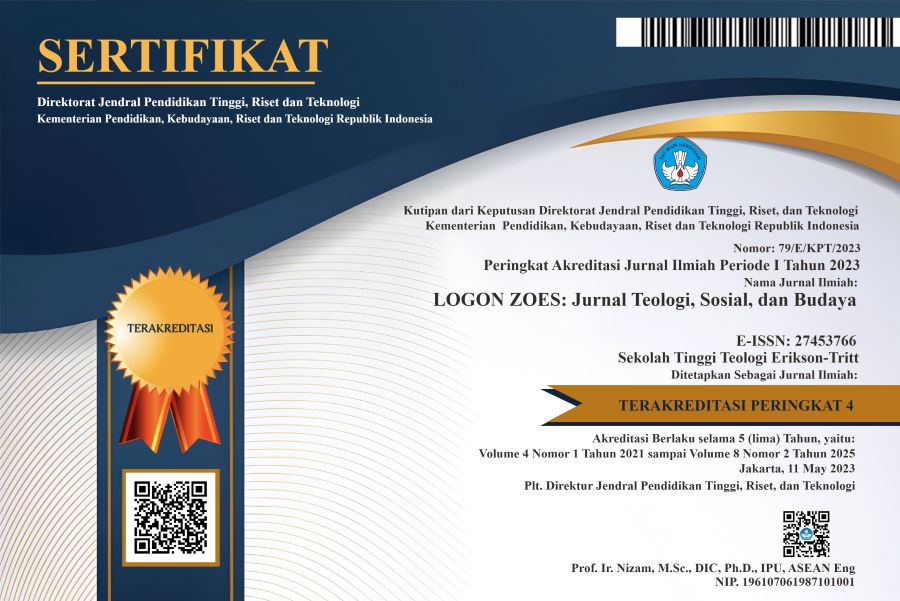Gambar Allah yang Ternoda: Menggugat Human Trafficking dengan dasar Teologi Imago Dei dalam Perspektif Perjanjian Baru
DOI:
https://doi.org/10.53827/lz.v8i1.9Keywords:
Hebrews 1:3, Imago Dei, Colossians 1:15, Modern SlaveryAbstract
Abstract
The New Testament, through verses such as Colossians 1:15 and Hebrews 1:3, emphasizes the importance of understanding and living out the concept of Imago Dei (the image of God) as a theological and ethical foundation in Christian life. Christ, as "the image of the invisible God" and "the radiance of God's glory," exemplifies how human life should be valued and honored, as well as how the dignity of every individual must be restored and liberated from all forms of oppression. As part of the church's mission, embodying the image of God leads to a tangible response to modern slavery, which is a form of human exploitation that undermines the essence of humanity. The church is called to raise awareness of this social evil and engage in efforts to free victims of modern slavery. This includes advocacy, support for institutions assisting victims, and the development of communities that uphold the values of justice, love, and human dignity. Living out the image of God is not merely a theological doctrine but a call to action in liberating humanity from modern slavery, upholding divine principles that prioritize human dignity in a world filled with injustice.
Abstrak
Kitab Perjanjian Baru, melalui ayat-ayat seperti Kolose 1:15 dan Ibrani 1:3, menekankan pentingnya pemahaman dan penghidupan konsep Imago Dei (gambar Allah) sebagai landasan teologis dan etis dalam kehidupan Kristen. Kristus, sebagai "gambar Allah yang tidak kelihatan" dan "cahaya kemuliaan Allah," menunjukkan teladan bagaimana seharusnya hidup manusia dihargai dan dihormati, serta bagaimana martabat setiap individu harus dipulihkan dan dibebaskan dari segala bentuk penindasan. Sebagai bagian dari misi gereja, penghidupan gambar Allah mengarah pada respons nyata terhadap perbudakan modern, yang merupakan bentuk eksploitasi manusia yang merusak esensi kemanusiaan. Gereja dipanggil untuk mengangkat kesadaran tentang kejahatan sosial ini dan terlibat dalam upaya pembebasan korban perbudakan modern. Ini melibatkan tindakan advokasi, dukungan terhadap lembaga yang membantu korban, serta pembangunan komunitas yang mendukung nilai-nilai keadilan, kasih, dan martabat manusia. Penghidupan gambar Allah bukan hanya sebuah ajaran teologis, tetapi panggilan untuk bertindak dalam membebaskan umat manusia dari perbudakan modern, dengan menegakkan prinsip-prinsip ilahi yang mengutamakan martabat manusia dalam dunia yang penuh ketidakadilan.
References
Bales, Kevin. Disposable People: New Slavery in the Global Economy. Berkeley, California: University of California Press, 2004.
Bruce, F.F. The Epistle to the Hebrews. Michigan, Grand Rapids: Eerdmans Publishing Company, 1964.
———. The Epistles to the Colossians, to Philemon, and to the Ephesians. William B. Eerdmans Publishing Company, 1984.
Copan, Paul. Is God a Moral Monster?: Making Sense of the Old Testament God. Grand Rapids: Baker Books, 2011.
Drane, John. “Human Trafficking and Modern-Day Slavery.” Mission Theology Advisory Group.
Fee, Gordon D. Paul, the Spirit, and the People of God. Grand Rapids: Baker Books, 1996.
Förster, Hans. “Pauls’s Request for the Slave Onesimus (Die Bitte Des Paulus Für Den Sklaven Onesimus).” Novum Testamentum 60, no. 3 (2018): 268–289.
Goldingay, John. Israel’s Life. Old Testament Theology 3. Downers Grove: InterVarsity, 2009.
Harris, Murray. Slave of Christ: A New Testament Metaphor for Total Devotion to Christ. Downers Grove: InterVarsity Press, 1999.
Holy, Bible. New International Version. Grand Rapids: Zondervan, 2011.
Hub, Bible. “Colossians 1:15,” n.d. https://biblehub.com/colossians/1-15.htm.
Martin, Ralph P. Ephesians, Colossians, and Philemon. Westminster John Knox Press., 2012.
Middleton, Richard. The Liberating Image: The Imago Dei in Genesis 1. Grand Rapids: Brazos Press, 2005.
Mounce, William D. Pastoral Epistles (Word Biblical Commentary). Nashville: Thomas Nelson, 2000.
Muzamhindo, Nyasha Daniel. “The Supremacy of the Son of God – Colossians 1:15-20.” A Clay Jar, 2022.
Osiek, Carolyn. “The Politics of Patronage and the Politics of Kinship: The Meeting of the Ways.” Biblical Theology Bulletin, 2009.
Reyes, Cazzie. “Justifying Human Trafficking: The Mind of a Trafficker.” End Slavery Now, 2016.
Saefatu, Meyrlin. “Ekomarturia.” INTEGRITAS: Jurnal Teologi 6, no. 1 (2024): 1–15.
Sitanggang, Pintor Marihot. “HUMAN TRAFFICKING (TINJAUAN TEOLOGIS GEREJA TERHADAP MASALAH HUMAN TRAFFICKING).” Jurnal Penelitian dan Pengabdian Masyarakat Nommensen Siantar 1, no. 1 (2021): 29–38.
Stott, John. The Contemporary Christian: Applying God’s Word to Today’s World. Leiceste: InterVarsity Press, 1992.
Wright, N.T. The Challenge of Jesus: Rediscovering Who Jesus Was and Is. Downers Grove: InterVarsity Press, 1999.
Downloads
Published
Issue
Section
License

This work is licensed under a Creative Commons Attribution-ShareAlike 4.0 International License.










